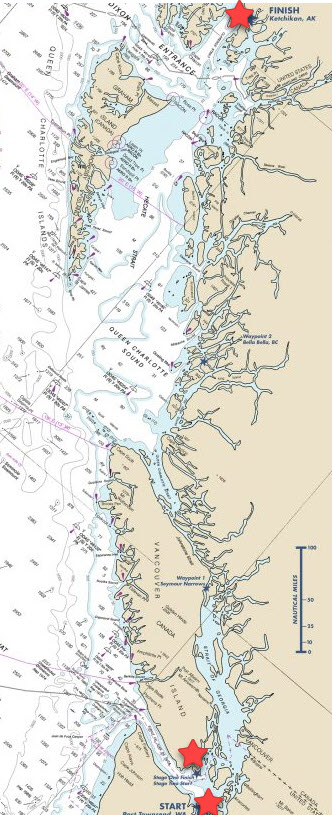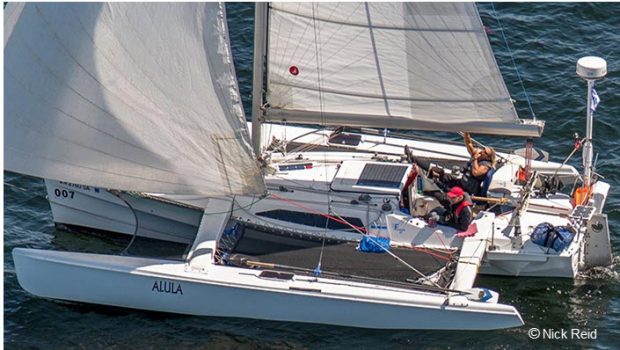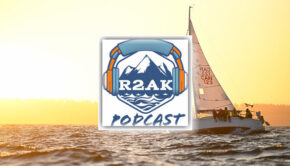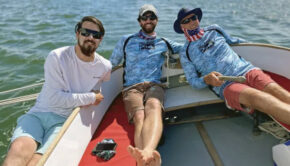R2AK Time Machine Day 16/25
Published on July 1st, 2020
For five years, the Race to Alaska, a 750-mile course from Port Townsend, Washington to Ketchikan, Alaska, proved that journey trumps destination, and while COVID-19 cancelled the 2020 edition, the Organizing Authority is, for 25 days, sharing their fondest memories from the previous races. Enjoy!
Team Alula’s completion of the 2016 R2AK was a masterpiece of human achievement, and they hold the title of R2AK’s most beloved disqualification. It started as three sailors on an F 27 trimaran who refused to be limited by their physical disabilities and became beloved for their unpredictable and powerful journey.
Though they did not officially complete the race, their arrival in Ketchikan is one of the most viewed Ketchikan finishes, with over 60,000 views, and nearly half-a-million views of CNN’s micro-documentary on the feat.
Their race was the first in our daily updates to be related to dancing about architecture, a wholly apt metaphor. The fact that we have used it twice is a testament to our racers’ achievements and our writers’ dislike of reading anything we have already written. We’ve included both the write-up and a link to the excellent micro-documentary.
READ:
2016 Day 16: Alula
To misquote someone smarter than ourselves: to attempt to tell the story of Team Alula in words is like dancing about architecture.
How do you reduce the everything of their odyssey to an iota of meaningful using the symbols created in an empire that’s a millennia and a set of numerals removed from Team Alula’s last three weeks; the intrepid voyage of three (then two, then two plus one, and then two plus another one) souls that brought Team Alula across the line in Ketchikan at a little after 9 p.m. Alaska time.
Team Alula is the product and the reason for the Race to Alaska. It humbles our false bravado to try to give justice to their story’s true depth. Hearing it come out in scraps and laughter was like catching water in your hands and hoping that whatever droplets are left can begin to convey the depth of the ocean that evaporates, reforms into rain, and returns.
It’s a cycle of layered complexity, where do you start?
Starting before the start, from the moment their rope-a-dope application rolled through the door to the bell ringing moment of a moment ago, their wily perseverance and mind shifting “here we are” made believers out of, and inspired the impressive, jaded, and skeptical—even us.
That they didn’t tell us they were chair-bound in their long list of killer accomplishments was a mix of a good joke and a fair point. “Somewhere along that resume I went from an able-bodied person to being in a wheelchair…I just didn’t mention it.”
It was the first cuff to the head sutra that Team Alula offered, and when the cartoon birds stopped flying around our brains we proudly and humbly owned the first part of our unknown prejudice and the world of possible started coming into focus in a whole new way. Their race was the same kind of different as the rest of them, but way more so.
Starting at the finish, there were crowds, and cameras (so many cameras), and the press (so many press), and worldwide hope and pride that ascended to hallelujah and applause as they rounded the corner and crossed the finish line. People on the dock had been camped out for hours. Hours in the damp just to make sure they didn’t miss the moment…and they might have read the tracker wrong. (Pro tip: It zooms in.)
The story of the finish is the story of more: more people, more love, more exhausted, more everything than even the first place team, whoever they were so many days ago. This was more important; these guys were disqualified.
People cheered, Team Ketchikan carried them the bell to ring to welcome them in and pre-empt the need for these exhausted sailors to mobilize their chairs. Team Excellent Adventure started what they hope is a new R2AK tradition of buying a set of $5 steak knives (full disclosure: the thrift store wanted $10 but it was 50% off day) to award whatever team finished behind them; a host gift of sorts to say thanks for not beating them. (Spike: “Great let’s get steak!” Anon.: “You might want to field test them on something softer first.”)
Zach’s mom and sister flew in for a finish line surprise that Zach had already predicted. What they saw when they rounded the breakwater was Zach at the helm, entrusted by his skipper and sailing instructor to pilot the last yards to the dock—an honor and accomplishment for a rookie sailor whose first sail was three months ago.
He’d accelerated from 0-750 in three weeks onboard. “I’d never sailed before. I can’t believe I made it.” He’s a stone-cold pro now but still so fresh to the experience that he’s never sailed a boat with an engine. “I’d see boats motoring by and think: Pansies!”
Starting in the middle, this was a race that nearly wasn’t, or at least nearly wasn’t completed. Team Alula found themselves four days and a man down in Campbell River and it looked like the end. “We almost rallied: Let’s each take a oar and let the auto helm steer us through Seymour!” That hot second was mercifully short and they had a sutra of their own that called the bluff of the R2AK: let’s DQ and just race to Alaska anyway.
Adding crew mid race is considered outside support that disqualifies, but they had unfinished business and screw the rules that get in the way. Hell or high water, they were going to Alaska.
They asked for help from their fellow racers and before the day was over families were called, work rearranged, and even though they were fresh to Ketchikan, Morgan Tedrow (Mail Order Bride) and Mark Eastham (Ain’t Brain Surgery) were the first hands waving in the air to bring the Alula boys home.
Morgan’s hitch was first up, and the moment he stepped on things clicked into right. This wasn’t a story of an able-body bailing out the chairs, this was about the chemistry of the right team. The right people at the right time, that’s all they needed. The right wind didn’t matter, the power of humans coming together around a single purpose, the power of community.
“Kind of a brave move really, coming on a boat full of strangers who hadn’t made it very far.”—and right before the jump off into the churn of Seymour Narrows. “You know what you’re doing, right?” was the question to Spike as they passed through Seymour’s gates at night, on a foul tide and an unbridled headwind. Spike’s answer was to put the spurs to her and roll a full ride. No need to not mention he was doing this part of his resume in a wheelchair, his actions were resume enough.
Morgan’s no slouch, and was the driver that kept them plunging through Johnstone Strait, charging Cape Caution, and mowing down teams who passed them during their Campbell River Can-Am independence celebrations that spanned the 1st to the 4th of July.
“We’d go to sleep, then look at the tracker—we passed like four teams! It was awesome!” They were cat and mouse with a few, but the ball of frenzy that is Team Super Friends was always right there; gaining in the calms, falling behind when the wind blew or they went aground (twice). “We got passed by them six times! You can sail by yourself to Alaska, but without a race you’d never drive it hard. It was awesome!”
Mark took the torch in Bella Bella, and right away took on a fifth dimension. “Sailing with these guys was a total privilege, trip of a lifetime. These guys are my brothers. It was an instant fraternity.” …or at least a frat house.
By the time they reached Ketchikan anything said was met with a punchline that fell lower and lower on that part of the Freudian slippery slope that starts at roughneck innuendo and extends into armpit farts. It was the hilarious and completely unrepeatable language of five days of inside jokes of the newest kind of best friends.
Stowing the boat, their worn-in patter passed around a ‘dirty oar’ until someone was lying down on the ‘dirty tramp’; if not for their drysuits, armpit farts were only minutes away. At one point they recanted the moment when their tracker showed the rowing souls on their trimaran’s two outer hulls on opposite sides the international border.
“Hey, how’s America?”, “Shut up Canada!” Their banter was a thin veneer over a pile of admiration and mutual respect. “They bill this thing as a badass race, so you know I was feeling pretty badass, Alula were the first guys I met back in Port Townsend. Totally popped my balloon, I’m nothing compared to them.”
Starting after the finish is the epilogue of community. The community who embraced them from around the globe, to the spirit of the community they formed, and reformed and formed again onboard, online, and on the docks in Ketchikan.
Boat secured, they rolled up the ramp in search of food that did not exist until the morning, even the 24 hour restaurant was closed (“Well, clearly not in a row…”, “Maybe that’s over like three days.”, “Maybe there’s a little dash and they’re only open 2-4.”) so Mike from Team Ketchikan, and Commodore of the Yacht Club of the same name ran to the store for groceries that were whipped into a feast.
“After a meal and a sleep the thing I most want to do is meet the other teams, and shake their hands. Where is Super Friends? I only know them by a big beard and a yellow jacket.” As much as they were all alone on their boat, charging through the wilds of the BC coast, we were all there with them, all of us inspired and driven to see this thing through to the end, and now the thing they wanted most was to greet the teams they traded tacks with for almost three weeks.
How do you begin sounding the depth of that story? We’ll start now.
Race details – Previous races – Facebook – Instagram
 What was to be in 2020:
What was to be in 2020:
Race to Alaska, now in its 6th year, follows the same general rules which launched this madness. No motor, no support, through wild frontier, navigating by sail or peddle/paddle (but at some point both) the 750 cold water miles from Port Townsend, Washington to Ketchikan, Alaska.
To save people from themselves, and possibly fulfill event insurance coverage requirements, the distance is divided into two stages. Anyone that completes the 40-mile crossing from Port Townsend to Victoria, BC can pass Go and proceed. Those that fail Stage 1 go to R2AK Jail. Their race is done. Here is the 2020 plan:
Stage 1 Race start: June 8 – Port Townsend, Washington
Stage 2 Race start: June 11 – Victoria, BC
There is $10,000 if you finish first, a set of steak knives if you’re second. Cathartic elation if you can simply complete the course. R2AK is a self-supported race with no supply drops and no safety net. Any boat without an engine can enter.
In 2019, there were 48 starters for Stage 1 and 37 finishers. Of those finishers, 35 took on Stage 2 of which 10 were tagged as DNF.
Source: Race to Alaska







 We’ll keep your information safe.
We’ll keep your information safe.